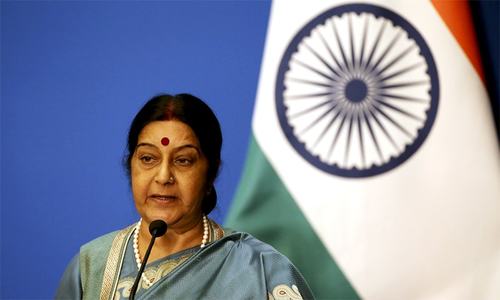The Pakistan Army's top brass in a meeting in Rawalpindi on Thursday decided after a discussion on sentenced Indian spy Kulbhushan Jadhav that there would be "no compromise" on similar "anti-state acts".
Chief of Army Staff (COAS) Gen Qamar Javed Bajwa presided over the 201 Corps Commanders' Conference at General Headquarters, where participants were briefed on Jadhav, an Indian spy who was sentenced to death by a Field General Court Martial earlier this week, Inter-Services Public Relations (ISPR) said in a press release.
Participants of the meeting reviewed the national security environment and recent developments in the region, as well as progress on Operation Radd-ul-Fasaad ─ a nationwide operation aimed at eliminating the "residual/latent threat of terrorism", which was launched in February after a deadly attack at a shrine in Sehwan.
The provision of support to the government for the ongoing population census was also reviewed.
The COAS appreciated the formations, intelligence agencies and law enforcement agencies for their successful execution of operations, ISPR said.
Jadhav's arrest and trial
Indian spy Kulbhushan Jadhav was arrested on March 3, 2016, through a counter-intelligence operation in Balochistan's Mashkel area for his involvement in espionage and sabotage activities against Pakistan, the Inter-Services Public Relations (ISPR) said in a statement on Monday.
Although the accused had been provided with a defending officer as per legal provisions, according to ISPR, Pakistan had turned down India's request seeking consular access to Jadhav last year due to his involvement in "subversive activities" in the country.
Jadhav was tried by the FGCM under Section 59 of the PAA and Section 3 of the official Secret Act of 1923, the statement said.
Jadhav confessed before a magistrate and court that he was tasked by Indian spy agency Research and Analysis wing to plan, coordinate and organise espionage and sabotage activities seeking to destabilise and wage war against Pakistan through impeding the efforts of law enforcement agencies for the restoration of peace in Balochistan and Karachi, the ISPR said.
Following the announcement, India summoned Pakistan's High Commissioner to New Delhi Abdul Basit on Monday and handed over a demarche saying, "If this sentence against an Indian citizen, awarded without observing basic norms of law and justice, is carried out, the government and people of India will regard it as a case of premeditated murder."
Dawn reported that Jadhav now has 40 days to file an appeal against the FGCM in the army’s court of appeal, according to retired Col Inamur Rahim, a military law expert.
In case the appeal court upholds the FGCM verdict, Jadhav would have the opportunity to seek mercy from the army chief and the president of Pakistan.
Simultaneously, Col Inam said, the convict could approach a high court if he felt that due process was not observed during his trial and his fundamental rights as an accused were not fulfilled.
Experts view the military's announcement about Jadhav's trial and prosecution as an unprecedented move, viewing it as a strong message to India as well as other foreign intelligence agencies.















































